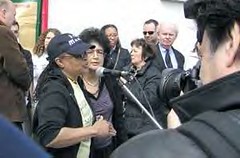
Mumia Abu-Jamal supporters Pam Africa and Julia Wright in France. Mumia's lawyer, Robert Bryan, pictured at right. A street was named in Mumia's honor in Saint-Denis earlier in 2006.
Originally uploaded by Pan-African News Wire Photo File
[col. writ. 1/11/08]
(c) '08 Mumia Abu-Jamal
As millions of people ready themselves for a (hopefully) paid holiday in remembrance of assassinated civil rights leader, Rev. Dr. Martin Luther King, Jr., we are forced to come to grips with who the man was, rather than who he has been projected to be.
In the words of noted historian (and once King's close confidant) Vincent Harding, America has largely chosen the path of amnesia rather than true remembrance of the man. Prof. Harding wrote, in his 1998 book, Martin Luther King: The Inconvenient Hero (Orbis Books):
"It appears as if the price for the first nationalist holiday honoring a black man is the development of a massive case of national amnesia concerning who that black man really was.
"At both personal and collective levels, of course, it is often the case that amnesia is not ultimately harmful to the patient. However, in this case it is very dangerous, for the things we have chosen to forget about King (and about ourselves) constitute some of the most hopeful possibilities and resources for our magnificent and very needy nation.
"Indeed, I would suggest that we Americans have chosen amnesia rather than continue King's painful, uncharted, and often disruptive struggle toward a more perfect union. I would also suggest that those of us who are historians and citizens have a special responsibility to challenge the loss of memory, in ourselves and others, to allow our skills in probing the past to become resources for healing and for hope.
"In other words, [if] Martin King cannot challenge those who make him a harmless black icon, then we surely can raise such a challenge -- assuming that we are still alive." {p.60}
What distinguishes the life and work of King towards his latter days, was his dedication to Black poor folks, a group that seems to be all but forgotten in the years since his passing.
While today's America seems to be on the brink of electing a Black person (or at least possibly nominating one), the plight of the Black poor could hardly be more perilous.
For it is on them that the twin weights of poverty and state repression are dropped, with little relief from a civil rights leadership which occasionally seems overwhelmed with the threats and conflicts facing those of better means and resources.
Indeed, much of that leadership is, as was Dr. King himself, quite highly educated, and seeking entree into the highest levels of state and corporate power; levels virtually impenetrable to millions of Black poor folks.
For them is reserved: the worst of public education the worst housing; brutal treatment by cops; ignored by political leaders (at least until election time rolls around), highest rates of joblessness; the highest incarceration rates -- we know this list can go on and on.
King Day may be remembered, but the man behind the name is fast disappearing.
It is virtually forgotten that he sacrificed his life on behalf of striking garbage men, Black workers who wanted a decent wage to be sure, but also wanted simple, human dignity.
In 1967, one year before his assassination, a perceptive journalist, the late David Halberstam wrote, in Harper's magazine his impressions:
"King has decided to represent the ghettos, he will work in them and speak for them.
"But their voice is harsh and alienated. If King is to speak for them truly, then his voice must reflect theirs; it, too, must be alienated, and it is likely to be increasingly at odds with American society." [Harding, 62]
America establishes a holiday, and promptly forgets what he lived for.
--(c) '08 maj
No comments:
Post a Comment